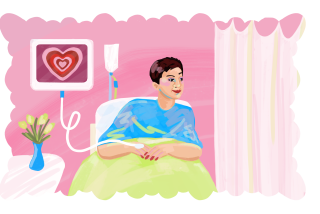A Psychiatrist Who Reaches Out and Makes House Calls
- Share via
“Help him! Help him! Help him! Help him! Help him! Help him! . . .”
The white-haired woman rolls in on a wheelchair, repeating an anguished plea she has made for hours . . . for days . . . for months on end. She is frail, wide-eyed in apparent fear, 90 years old. She suffers severe dementia. Her home is here in the labyrinth of tidy rooms and long hallways that make up the Antelope Valley Convalescent Hospital in the desert town of Lancaster.
A social services coordinator, Anne Kieliszek, has wheeled Marsha--not her real name--into a bright office where Dr. Liane Colsky, a traveling geriatric psychiatrist, is providing treatment for patients who suffer devastating cases of Alzheimer’s disease, depression and physical ailments related to age. All too often, they await only the day that they will die.
“Tell the doctor all the things we’ve been talking about,” the social coordinator urges this patient in cheerful tones.
Marsha becomes distressed. “I can’t remember!”
“You can’t?”
“No, I’m not good at it!”
“We were talking about your favorite food . . . and your favorite flowers. . . .”
“I’m not good at talking!” The words come out in terrified tones. For a moment, Marsha appears ready to cry. Even as Kieliszek is reassuring her, the mantra resumes--the involuntary, relentless sputtering of some malfunctioning brain circuit: “Help him! Help him! Help him! Help him! Help him! . . .”
*
Colsky, 34, is an upbeat woman who counts herself as one of the few psychiatrists--or doctors of any kind--willing to make house calls. She became interested in geriatric psychiatry while a medical intern. That is when her father became afflicted with terrible memory problems before his death in 1982.
A Woodland Hills resident, Colsky travels far and wide, visiting private homes and convalescent hospitals. Most of her patients are in their 80s or 90s--the oldest was 106.
For many--the shriekers, the screamers, the hopelessly confused--Colsky can do little except provide momentary company and reassurance. For others, she is able to recommend social groups to counter depression, or prescribe calming medications. Occasionally, she learns of medical conditions that contribute to depression or confusion, and she works with the patient’s physician to plan treatment.
As part of her decidedly unconventional style, Colsky brings her dog, Rusty, a vizsla, to treatment sessions; some patients seem to find a dog comforting.
“Do you know what this is?” the psychiatrist asks Marsha.
“It’s a dog, of course!”
“Do you want to pet this dog?”
Marsha lapses into the chant. “Help him! Help him! Help him!”
“Why don’t you pet the dog,” Colsky suggests.
Marsha keeps rambling. “Help him! Help him! Help him!” Her arm, skinny as a stick, reaches out. And suddenly, she speaks to the animal. “Hellooooo there, baaaaby!”
Moments later, Colsky moves on to deeper discussions. Who, Colsky wants to know, needs help?
Colsky wonders if it is the patient’s husband, Joseph, who is deceased. The patient says Joseph is her son.
“What’s your husband’s name?”
“I don’t know! Help him! Help him! Help him! . . .”
“Is your husband alive?”
“Yes, he’s alive.”
“Where is he?”
“Help him! I don’t know. I don’t know! Help him! Help him! Help him! . . .”
*
Further questioning and more confusing answers make it seem likely that Marsha is crying for help for herself. A decision is made to adjust her medication to try to calm her and to discuss with her doctor her abnormal blood test results. An underlying physical problem, Colsky theorizes, might be contributing to her torment.
On this day, Colsky is seeing five other patients over a period of a few hours. One is a thickly bespectacled man of 85 whose mantra is “Mmumm-mmuumm-mmumm-mmuumm-mmuumm.” But his medication is working--he is calmer, in good spirits.
Another patient, 95, believes that nurses are plotting to steal things from her room. She fears they will take a bar of soap and some letters.
Still another is a dirty-minded woman of 81 on an oxygen tube. And a woman of 95 who periodically shrinks back in terror, shrieking “Noooooooo!”
The youngest is 69, a woman whose husband died three weeks ago. With terrible back pain and her head “bursting 90% of the time” with migraines, she is too much for her children to handle. So she is here, in a convalescent home, acutely depressed. She even had to give away her Pomeranian.
“I lost my husband and my dog and moved out of my home, all in three weeks’ time,” she says.
“That’s a lot to go through.”
The talk is pleasant, meandering. An antidepressant drug is suggested, at least for a while. The woman had been reluctant to see the doctor, but by the end she seems talkative, a little relieved.
“I’m glad you came in,” Colsky tells her.
“I’m glad I did, too,” she says from her wheelchair. “I’m glad somebody cares.”
More to Read
Sign up for Essential California
The most important California stories and recommendations in your inbox every morning.
You may occasionally receive promotional content from the Los Angeles Times.













